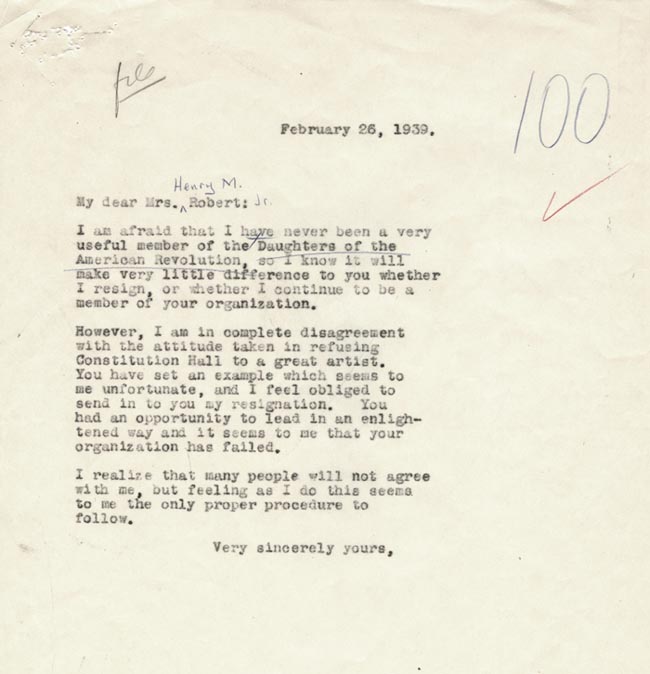 Publicador de conteúdo web
Publicador de conteúdo web
Eleanor Roosevelt Resigns from the DAR
In February 1939, Howard University, a black educational institution in Washington DC, invited Marian Anderson, an internationally famous black contralto singer to give a concert. Officials at the University expected a large crowd to turn out for the concert and were concerned that their auditorium would be too small. They asked the Washington Headquartered Daughters of the American Revolution (DAR) if they could use their auditorium, Constitution Hall. The DAR refused, explaining that local conditions and custom did not favor such a move. They had adopted a “black exclusion” rule several years earlier after they had allowed a black tenor Roland Hayes to perform in the Hall. He had refused to sing in a segregated a hall and the DAR responded with opening seating. But those who attended that concert complained about the mixed seating so loudly that the DAR implemented their exclusion rule.
Protest over Ms. Anderson’s exclusion arose within the black artistic and religious communities, but when DAR member Eleanor Roosevelt resigned from the organization in protest, there were far reaching social and political implications as well.
Mrs. Roosevelt had long been a champion of equal economic, social and political rights for all citizens, regardless of race or gender. Her support of Ms. Anderson was not a surprise to the black community. To the nation at large, Mrs. Roosevelt’s personal act of conscience was a stunning public statement. A Gallup poll taken at the time showed that 67% of the public approved of her action. Moving quickly to capitalize on this public support, Anderson’s manager Sol Hurok proposed that Anderson give an open-air concert at the Lincoln Memorial. Harold Ickes, the Secretary of the Interior promptly approved the idea and on April 9th a crowd of 75,000 people assembled before the Lincoln Memorial to hear Ms. Anderson sing. Below is a copy of Mrs. Roosevelt’s DAR resignation letter.
 Publicador de conteúdo web
Publicador de conteúdo web

 Publicador de conteúdo web
Publicador de conteúdo web
Here are some things to consider and discuss after reviewing Mrs. Roosevelt’s letter:
- Does the fact that the DAR based their ‘exclusion rule’ on a negative experience that resulted from having previously allowed a black singer to perform before an integrated audience hold any merit?
- Do you think it was fair of Mrs. Roosevelt to resign her membership in the DAR? Why couldn’t she have tried to persuade the organization to take a different course of action and still have remained a member?
- Can you think of a situation when it might be appropriate to deny an individual or a group the use of a public auditorium? Who should be able to make such a determination? Upon what criteria should they base their decision?



